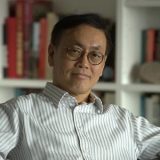Economics & Finance
• 9 minute read
The Future of U.S.-China Economic Ties in the Biden Era

Tse, Edward(謝祖墀), Yuen, Andrew Chi-lok(袁志樂)
CUHK experts anticipate incoming U.S. president to be focusing on building global alliances in dealing with China, as well as escalation in technological race
By Jaymee Ng, Principal Writer, China Business Knowledge@CUHK
With Joe Biden set to be inaugurated as the 46th President of the United States on January 20, 2021, all eyes are now turning to how the incoming administration will manage the country’s critical trading relationship with China.
At stake is one of the most important bilateral trading relationships in the world. The U.S. is China’s top trading customer, making up for nearly 17% (or over US$400 billion) of the country’s total exports in 2019. On the other hand, China is the America’s third largest market after Canada and Mexico, accounting for around 11% (around US$160 billion) in exports during the same year.
The U.S.-China trade war, instigated by a confrontational Donald Trump in 2018, by some estimates have led to as much as US$750 billion in lost revenues by global firms, and has cost at least US$1.7 trillion loss in stock market share prices for U.S. companies. A United Nations Conference on Trade and Development has described it as a “lose-lose” scenario. What began with tit-for-tat levying of tariffs has since metastaised into a broader economic dispute between the two countries involving everything from 5G telecommunications technologies to the TikTok social media platform, and has even seeped into recriminations over the origins of the COVID-19 currently spreading across the globe.
With the incoming administration set to be helmed by a steadier hand in Joe Biden, will the U.S.-China economic ties improve or will the relationship continue on its downward trajectory?
“If the U.S. wants to compete with China, then they need to make progress as fast as China.” – Dr. Edward Tse
“Americans are concerned about the rise of China,” says Edward Tse, Founder and CEO of global strategy and management consulting firm Gao Feng Advisory and Adjunct Professor at The Chinese University of Hong Kong (CUHK) Business School’s Department of Marketing. Specifically, he says that Americans in general are concerned that China could soon eclipse the U.S. both economically and as a world power. This is in contrast to the outlook adopted by many other countries, which view China’s rise as an opportunity to bolster their own flagging economic growth and are less unsettled by the prospect of the emergence of a world order with America and China on opposing poles.
“From the administrative level, regardless of who the president is, that concern will continue and hence U.S. policy will continue to deter China’s rise,” says Dr. Tse in an interview. He notes that there is a general consensus in the American public as well as bipartisan political support that the government needs to take a more confrontational approach in its dealings with Beijing. However, the inherent nature of the U.S. political system means new legislation and policies would require thorough debate and would be slow in implementation.
Dr. Tse expects the Biden administration may switch from a unilateral approach – that is, putting America’s interests first, something favoured by President Trump – towards a more multilateral approach and seek to build support in the global community in dealing with Beijing. As a part of his “America First” agenda, President Trump withdrew the country from several international organisations, such as the Paris Climate Accord and the Trans-Pacific Partnership (TPP). Joe Biden has already announced that he would let the U.S. to re-enter into the Paris Climate Accord as early as February, and there is every reason to believe that he will follow through on his word, he says.
On the ongoing U.S. and China trade war, Dr. Tse, who has led the China Business of Boston Consulting Group and Booz Allen Hamilton (later rebranded as Booz & Company) expects the current trade policies – in the form of tariffs levied against Chinese goods – by President Trump would be continued in the short term, but he sees Biden complementing them with other measures – such as the aforementioned focus on building alliances – in his dealings with China going forward.
Stronger “Co-opetition”
While the last four years have?) seen Trump approach U.S.-China relations from a competitive standpoint, Dr. Tse sees the relationship becoming increasingly “co-opetitive”, with the two countries cooperating on some issues and competing on others. “I think the co-opetition scenario will manifest over time, and that’s what Biden wants,” Dr. Tse says. “There are many issues that China and the U.S. need to work together and these issues are global, such as climate change and public health. These issues cannot be solved by one country alone but require the big powers to co-operate.”
Despite the increase in tension between the two countries, Dr. Tse points out that business relationships between companies in the two countries, excluding those in the technology sector, have remained strong. In fact, many international companies are continuing to strengthen their investment and focus in China, eyeing the country’s increasing strength in innovation and technology.
“China did not become innovative overnight. There are an incredible number of internet companies in the country. Initially, multinationals didn’t even pay any attention to these Chinese internet companies until all of a sudden, they found out that Chinese tech companies are everywhere and only then they realised that they need to catch up,” Dr. Tse says, referring to the rise of Chinese internet giants such as Tencent and Alibaba.
Not only are U.S. companies now realising that they needed to catch up with their Chinese counterparts, Dr. Tse adds that the U.S. is already far behind China in terms of incorporating technology into infrastructure. As an example, while U.S. roads still suffer from deterioration, many new technologies, such as 5G, as well as 3D road mapping and sensors, have already been implemented on China’s roads. China is also expected to build the world’s first smart highway.
This is another area that Dr. Tse sees potential change. He sees the Biden administration implementing industrial policy – the idea that in pursuit of a national goal, the government should target particular industries to support, a tool which has formed the backbone of China’s own economic reforms since the 1980s. Industrial policy, with its associations with communism and socialism, was once a taboo subject among American politicians and economists. Dr. Tse thinks that it would be advantageous to the U.S. and the world if the new administration would implement it.
“For example, the development of innovation has always relied on a combination of government policy and individual companies. It would be wrong to rely everything on the market to decide. If the U.S. wants to compete with China, then they need to make progress as fast as China,” says Dr. Tse.
In what he calls “one world, two systems” scenario, Dr. Tse thinks that the U.S. and China clearly have two different development models and their paths would continue to differ in the future. For companies that want to enter both markets, including Chinese companies that want to expand to overseas markets or international companies seeking entry into China, they need to come up with entirely different strategies for each market.
Tech War
On a different note, Andrew Yuen, Senior Lecturer at the Department of Decision Sciences and Management Economics at CUHK Business School, says that the crux of the U.S.-China relations was never been about trade imbalances. The real battlefield was technology.
“If the problem was indeed trade conflict, then the solution can be as simple as buying more aircraft or soybeans,” says Dr. Yuen, speaking at a recent CUHK Business School webinar. “But the real focus is the competition between the two super-powers in the world, and especially their competition in technology. This is a game where the winner takes all.”
Unlike President Trump’s push for China to buy more American products, Dr. Yuen sees the Biden administration focusing on technology. In his “Innovate in America” campaign, Biden announced a US$300 billion investment in researching and developing and breakthrough technologies, ranging from electric cars to 5G and artificial intelligence. China, on the other hand, has just unveiled its new five-year plan that will guide the country’s economic strategy through 2025 and laid out a 15-year strategy called Vision 2035 that projects a major step up in its economic, technological and comprehensive power.
“If the problem was indeed trade conflict, then the solution can be as simple as buying more aircraft or soybeans.” – Dr. Andrew Yuen
The U.S. and China have been locked in a fierce competition to dominate various fields of technology. Although the U.S. is still leading the race to develop artificial intelligence by having the largest number of researchers publishing AI-related papers or acquiring AI-related patents, China is quickly catching up and is expected to surpass the U.S. in this area in 2021. 5G is also another major battleground between the two countries. This new telecommunications technology not only promises faster downloads, but the foundation to support the next generation of infrastructure, such as an increasing number of internet-connected devices and to power so-called smart cities.
China is currently leading the 5G race with Huawei holding the highest number of 5G patents and as a top global supplier of 5G equipment. Based on this, it is hardly surprising that President Trump has sought to block Huawei from the U.S. market by imposing various sanctions citing national security concerns, he says.
Although China will remain a major competitor in the eyes of the Biden administration, Dr. Yuen thinks that there will be major changes at the tactical level in terms of how Biden handles the competition.
“If we look at Joe Biden’s experience in Congress and as the vice president, he is very good at diplomatic relationships and he knows how to cooperate with other countries to achieve his objectives,” Dr. Yuen comments. “If other countries have similar ideologies or if their policies align with the U.S., then it will be easier for them to work together [against China].”

Tse, Edward(謝祖墀)
Adjunct Professor

Yuen, Andrew Chi-lok(袁志樂)
Senior Lecturer
Academic Director, MBA Programmes
Director of Policy and Knowledge Transfer, Aviation Policy and Research Centre

